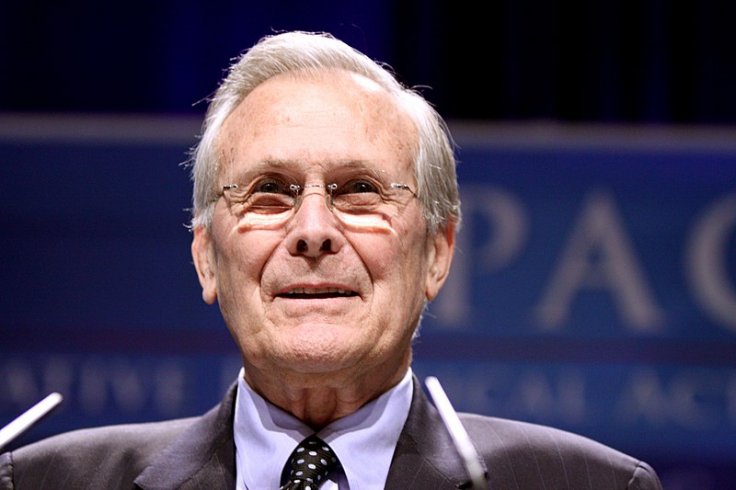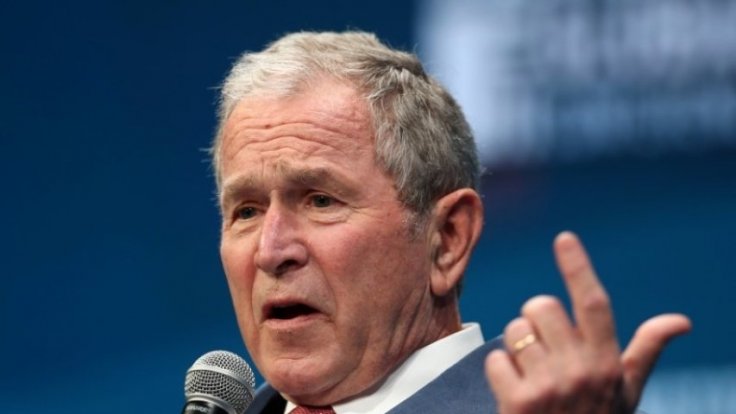Donald Rumsfeld, who served as defense secretary for George W Bush, has died at the age of 88. Rumsfeld "was surrounded by family in his beloved Taos, New Mexico," his family said in a statement.
In death, as in life, Rumsfeld evoked polarizing opinions. His unofficial title as the 'architect of the Iraq and Afghanistan wars' never faded away and he had critics and admirers in equal measure.
Divisive Figure
While former President George W Bush praised him saying Rumsfeld never 'paled before tough decisions, and never flinched from responsibility' many see him as the primary reason behind the deaths of thousands of people in Iraq and Afghanistan and the years of instability in those countries following the US invasion.

Rumsfeld and former vice-president Dick Cheney were seen as the two crucial figures that drove the foreign policy of President Bush. While Cheney was a larger-than-life figure who wielded enormous influence during the Bush presidency, it was Rumsfeld who ran the mighty war machine of the United States in an era of great changes.
Astute Leader of 'War Criminal'?
He is known as the man behind the taking down of Saddam Hussein in Iraq, a milestone event that plunged the country into chaos thereafter. He was accused by anti-war campaigners as a 'war criminal' for his roles in unleashing one of the biggest US military operations in the post-World War II era. His role in the detention of suspects in Guantanamo Bay, and the torture of Iraqis by US jailers at Abu Ghraib prison were denounced worldwide.
After the launch of the Afghanistan invasion in the aftermath of the 9/11 attack on the US, Rumsfeld trained his guns on Saddam Hussein. He was the most hawkish of the US officials who clamored to dethrone Saddam in Iraq. Rumsfeld was the key person behind the 'weapons of mass destruction' theory that the US used to overrun Iraq and depose Saddam.
However, his equivocations around the WMD theory still remain as evidence to the notorious misjudgment of the US administration nearly 20 years ago.
Weapons of Mass Destruction
There were questions on the lack of evidence for the presence of weapons of mass destruction in Iraq, which were steamrollered by the US hawks led by Rumsfeld. Grilled over the lack of evidence, Rumsfeld once melted down into what still remains as one of of the most telling examples of he misjudgments from that era.
"Reports that say that something hasn't happened are always interesting to me, because as we know, there are known knowns; there are things we know we know," Rumsfeld said.

"We also know there are known unknowns -- that is to say we know there are some things we do not know. But there are also unknown unknowns -- the ones we don't know we don't know," he added.
Pilot, Wrestler, Congressman
Rumsfeld was born in Chicago, and was trained as a pilot and fighter instructor. He was also an accomplished wrestler and played as a defensive back on Princeton University football team. He served in the Navy during the Cold War and then was elected to Congress.
Rumsfeld was the youngest person ever to become the US defense secretary. In 1975, he was named to that position, at the age of 43, by President Gerald Ford. Under Bush, he got a second term as the defense secretary.
Rumsfeld defended the Iraq war for years after he stepped down as the defense secretary. he also wrote a book about the stint, titled "Known and Unknown."
Bush said Rumsfeld was "a man of intelligence, integrity, and almost inexhaustible energy. He "never paled before tough decisions, and never flinched from responsibility".
Former US Secretary of State Henry Kissinger had once described Rumsfeld as "the most ruthless man" he knew. Rumsfeld was a 'skilled full-time politician-bureaucrat in whom ambition, ability, and substance fuse seamlessly," Kissinger had said.









